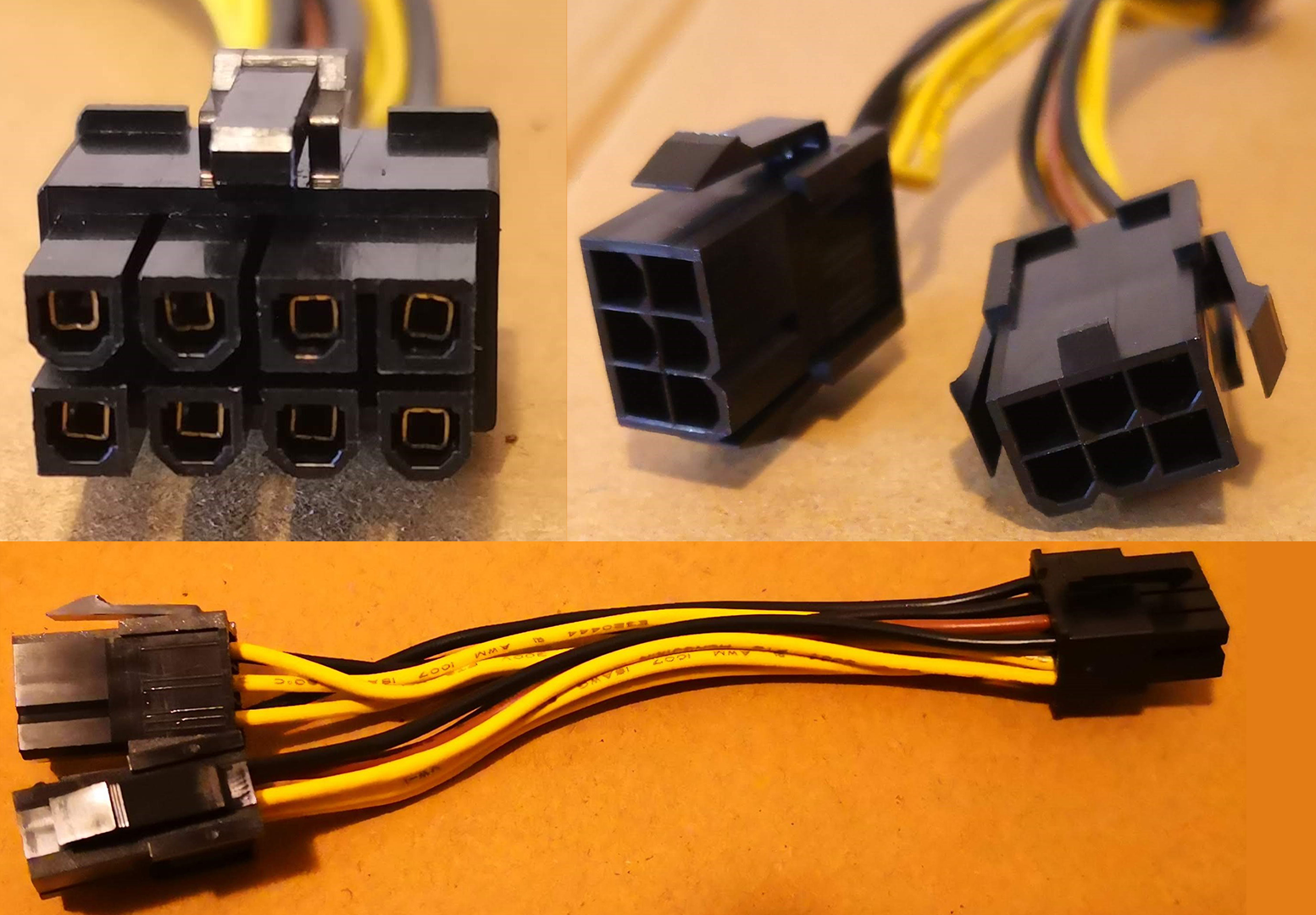Hello everyone, I’m doing some box cleaning and I found a bunch of cables which I’ll ask for your help for identification, if you don’t mind 🙃
So, as the title says, how do you call this cable?

Thank you!
Hello everyone, I’m doing some box cleaning and I found a bunch of cables which I’ll ask for your help for identification, if you don’t mind 🙃
So, as the title says, how do you call this cable?

Thank you!
somewhat related PSA: never use old psu cables with a different model psu. As far as I understand it they aren’t standardized as to which wires connect which pins, so you risk destroying components if you mix and match cables and psu
This.
I would personally call OP’s cable “house-fire”
Nah it’s fine. Even if he plugs in only one of the 6 pins it’s more than capable of the 150w the 8 pin output is rated for. You’d need a really old and shitty PSU for it to actually use different gauge wires for the 6 Vs 8 pin, since the only difference is 2 extra ground wires (and a higher power rating).
A house fire is unlikely, as you definitely have the PC under supervision on first power-on. The wire insulation can catch fire under certain circumstances but it won’t burn your house down if you’re quick to act.
No, don’t throw them away. You can definitely replace one with another if all the wire colors match and the wires are thick enough and by a reputable brand (so that it’s actual copper). But yes, 4-, 6- and 8-pin Molex connectors have at least 2 different possible pinouts, the 24-pin one should be standard.
But if you’re naïve and think they’re plug-and-play, you’ll be playing with a plug-and-fire setup. Most of such swaps will cause a short circuit, in which case fuses or electronic protection will probably trip before the cable insulation starts burning (if the copper is thick enough to sustain 100 A for a second and not heat up by 200 °C). However, pretty much no PC components have polarity protection so you will need to go shopping for an entirely new build.
I’m not one the throw things away, but please don’t reuse them if you don’t know what your doing.
The PSU end of PSU cables are usually different from brand to brand, sometimes model to model (thanks Corsair), so yeah as long as the pinout matches you should be fine, but I usually wouldn’t risk it. Oh the cables are usually all black too, so good luck toneing it out with a multimeter.
For example Corsair vs Seasonic, pay attention to the PSU side:
Yeah, check any documentation available and even check which pins are connected to the same voltage rails. In this case, common sense says that the GPU most likely be fine as long as it uses less than 2/3 the rated power of the cable but any drives will pop.
Thanks for the info, everyone!
I made full custom cables for my last build then the PSU died. RMAed it and got a replacement that was on generation newer.
If I hadn’t have learned that cables weren’t standardized while making the first batch, I would have fried everything in my PC.
I never wound up remaking/rerouting everything so it just looked like shit for the following 2 years. I probably won’t make custom cables again for that reason, though it did look really nice
Its for this reason i use straight-through extensions when builing my PC. Lets me route cables where/how i want. Then they connect to the psu cables somewhere sensible and hidden. Adds to the cost but makes the whole build (so upgrades/replacement) so much more modular.
Just have to make sure you get decent ones and not thin core cheap crap.
I almost did the same as you, and decided to beep out some of tge psu cables as i was waiting for the new PSU to arrive. Immediately bought straight extensions, and havent looked back since!
I just went with all black this time to skip out on all of it lol
Pretty much everything is hidden so I used to stock cables
Wow, never new about this, rather important to know about this actually.
I’ve absolutely fried a brand new HDD in my server because of this. I thought it was a cable for that PSU, but it was a different brand.
Most likely, the motor and head circuitry survived. The burnt PCB can probably be cheaply replaced without cracking open the sealed internals of the drive mechanism, and the drive should work as normal after a test and calibration. Of course, wrong polarity will destroy SSDs and most other PC parts beyond the point of repair.
It’s always safer to just leave random mystery cables alone.
However, if you have a multimeter and some patience, they can still be used safely. You just need to know what you’re doing, look up the pinout and measure the voltages before plugging anything into any sensitive components.
Not planning to plug anything :D Just want to get rid of some stuff and I need to somehow label it. Thanks for the info though!
That sucks. Glad I saw your comment. Hope I remember when it matters.